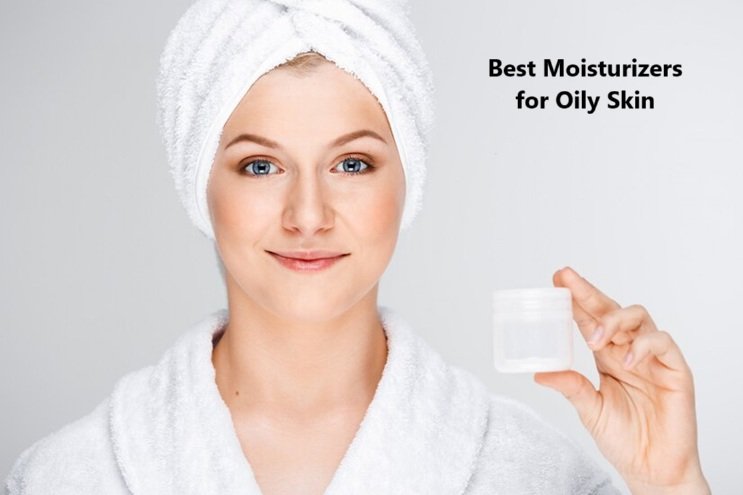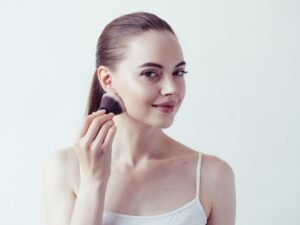
Best Moisturizers for Oily Skin
Finding the perfect moisturizer for oily skin can feel like searching for a needle in a haystack. You need a product that hydrates without clogging pores, controls shine without making your face feel greasy, and nourishes the skin without causing breakouts. If this sounds familiar, you’re not alone. Oily skin types face unique challenges when it comes to skincare, and finding a Best Moisturizers for Oily Skin that balances hydration and oil control is key.
This comprehensive guide will walk you through everything you need to know about choosing the best moisturizers for oily skin. We’ll explore what makes oily skin tick, why hydration is still crucial, and how to choose the perfect Best Moisturizers for Oily Skin to keep your skin looking fresh and healthy.
Understanding Oily Skin
Before we dive into the best moisturizers for oily skin, it’s important to understand the root cause of oily skin and why it behaves the way it does.
What Causes Oily Skin?
Oily skin occurs when the sebaceous glands in your skin produce too much sebum, the natural oil that keeps your skin lubricated. While sebum is essential for maintaining healthy skin, too much of it can lead to clogged pores, acne breakouts, and that familiar greasy sheen.
Several factors can contribute to excess oil production:
- Genetics: If your parents had oily skin, chances are you might, too.
- Hormones: Fluctuations in hormones, especially during puberty or pregnancy, can lead to increased oil production.
- Diet: High-glycemic foods (like sugar and refined carbs) can cause spikes in oil production.
- Weather: Hot and humid climates can exacerbate oily skin.
The Importance of Hydration for Oily Skin
Contrary to popular belief, oily skin still needs proper hydration. The myth that moisturizing oily skin will make it worse is widespread, but it’s entirely false. In fact, not using a moisturizer can trigger more oil production as your skin tries to compensate for the lack of moisture.
Why You Still Need a Moisturizer for Oily Skin
So, why exactly does oily skin still need a moisturizer? You might be thinking, “My skin already produces enough oil—why add more moisture?” Here’s why skipping Best Moisturizers for Oily Skin is not a good idea for oily skin:
Balancing Oil Production
Oily skin often overcompensates when it feels dry. By providing it with the right level of hydration, you can prevent the skin from producing more oil. A good, lightweight moisturizer will keep your skin balanced and reduce that greasy feeling.
Preventing Skin Dehydration
While oily skin produces more sebum, it doesn’t necessarily mean your skin is well-hydrated. Oily skin can still be dehydrated, which means it lacks water content. A well-formulated Best Moisturizers for Oily Skin helps lock in water, keeping the skin plump and hydrated without adding excess oil.
Maintaining Skin Barrier Health
The skin’s barrier is your first line of defense against environmental stressors like pollution and bacteria. A weakened skin barrier can lead to irritation, breakouts, and excess oil production. A good moisturizer strengthens the skin barrier, keeping your skin healthy and resilient.
Key Ingredients to Look for in Best Moisturizers for Oily Skin
Choosing the right moisturizer for oily skin often comes down to its ingredients. Here are some of the top ingredients you should look for:
Oil-Free and Non-Comedogenic Formulas
The best moisturizers for oily skin should be oil-free and non-comedogenic, meaning they won’t clog pores. These formulas prevent breakouts while providing hydration.
Hyaluronic Acid: Lightweight Hydration
Hyaluronic acid is a superstar ingredient for all skin types, but it’s especially beneficial for oily skin. This lightweight molecule attracts water and holds up to 1,000 times its weight in moisture, hydrating the skin without adding heaviness or grease.
Niacinamide: Regulating Sebum Production
Niacinamide, or Vitamin B3, is a versatile ingredient known for its ability to regulate sebum production. It helps to reduce the appearance of pores and control excess oil, making it a must-have for oily skin.
Salicylic Acid: Gentle Exfoliation
Salicylic acid is a beta hydroxy acid (BHA) that gently exfoliates the skin, unclogs pores, and prevents acne. It’s perfect for oily skin as it helps keep breakouts at bay while controlling oil production.
Types of Best Moisturizers for Oily Skin
Not all moisturizers are created equal, especially when it comes to oily skin. Here are the most common types that work best for oily skin:
Gel-Based Moisturizers
Gel-based moisturizers are lightweight, water-based formulas that absorb quickly into the skin. They provide hydration without the greasy feel, making them ideal for oily skin types.
Water-Based Moisturizers
Water-based moisturizers are oil-free and feel ultra-light on the skin. They are excellent for keeping the skin hydrated without causing breakouts or excess oil production.
Mattifying Moisturizers
Mattifying moisturizers are designed to control shine and give your skin a smooth, matte finish. They often contain ingredients like silica or clay to absorb excess oil throughout the day.
Top 10 Best Moisturizers for Oily Skin in 2024
Let’s dive into the top-rated moisturizers specifically formulated for oily skin.
1. Neutrogena Hydro Boost Water Gel
This drugstore favorite is packed with hyaluronic acid to deliver intense hydration without feeling heavy. Its gel formula absorbs quickly and leaves a refreshing finish, making it perfect for oily skin.
2. La Roche-Posay Effaclar Mat
This mattifying moisturizer is designed to reduce excess oil while refining the appearance of pores. It’s perfect for those with shiny T-zones and uneven skin texture.
3. CeraVe PM Facial Moisturizing Lotion
This lightweight lotion contains niacinamide and ceramides, which help restore the skin barrier and reduce oil production overnight.
4. Paula’s Choice CLEAR Oil-Free Moisturizer
This oil-free moisturizer offers hydration while keeping acne-prone skin calm. It contains antioxidants and soothing ingredients to balance oily skin.
5. Bioderma Sebium Mat Control
Bioderma’s Sebium Mat Control is a mattifying Best Moisturizers for Oily Skin that helps control shine and smoothes skin texture without clogging pores.
6. Clinique Dramatically Different Hydrating Jelly
This refreshing water-jelly formula delivers 24-hour hydration and is packed with anti-pollution technology, ideal for those with oily and combination skin.
7. Murad Skin Perfecting Lotion
Murad’s lightweight lotion hydrates while refining the skin’s texture. It’s great for acne-prone, oily skin types as it contains retinol and salicylic acid.
8. Kiehl’s Ultra Facial Oil-Free Gel Cream
This oil-free gel cream from Kiehl’s provides lasting hydration while visibly reducing shine.
9. Vichy Normaderm Phytosolution Double-Correction Daily Care
This lightweight moisturizer helps reduce oiliness and blemishes while providing hydration.
10. EltaMD AM Therapy Facial Moisturizer
EltaMD’s AM Therapy Facial Best Moisturizers for Oily Skin hydrates and improves skin texture without clogging pores, making it a favorite for sensitive, oily skin.
How to Apply Moisturizer for Oily Skin
Using the right moisturizer is only half the battle—knowing how to apply it correctly can make all the difference. Many people with oily skin tend to avoid applying too much product or skip moisturizing altogether, which can actually lead to more issues like dehydration or excess oil production. Let’s break down the best practices for applying Best Moisturizers for Oily Skin.
Step-by-Step Application Guide
- Start with a Clean Face: Always begin with a freshly washed face. Use a gentle, oil-free cleanser that won’t strip your skin of its natural oils but will remove excess sebum, dirt, and impurities. Pat your face dry with a clean towel; don’t rub it aggressively, as this can irritate your skin and cause more oil production.
- Use a Toner (Optional): If you use a toner, apply it before your moisturizer. Toners designed for oily skin often contain ingredients like witch hazel or salicylic acid, which help to minimize pores and control oil. However, this step is optional and should be based on your skin’s sensitivity.
- Apply a Pea-Sized Amount of Moisturizer: When it comes to moisturizing oily skin, less is more. A small, pea-sized amount is usually enough to cover your entire face. If you use too much, it could sit on the surface of your skin and feel greasy.
- Massage the Moisturizer Gently: Use your fingertips to gently massage the moisturizer into your skin using upward and outward motions. Pay extra attention to areas that tend to get dry, like the sides of the nose and forehead, while being cautious not to over-apply to the oilier areas, such as the T-zone.
- Let the Moisturizer Absorb: Give your moisturizer a minute or two to fully absorb into your skin before applying makeup or sunscreen. This helps to ensure that the product has penetrated your skin without leaving a shiny finish.
How Often Should You Moisturize Oily Skin?
For most people with oily skin, moisturizing twice a day—once in the morning and once at night—is ideal. In the morning, opt for a lightweight, mattifying moisturizer that helps control shine throughout the day. At night, a gel or water-based moisturizer will help hydrate your skin without clogging pores or making your skin feel greasy.
If your skin feels particularly oily during the day, you can also use blotting papers or a mattifying powder to reduce shine without over-moisturizing. Avoid the temptation to skip moisturizing altogether, as this can cause your skin to overcompensate by producing even more oil.
Common Myths About Best Moisturizers for Oily Skin
Despite the wealth of information available on skincare, several myths about Best moisturizers for oily skin still persist. It’s time to debunk these common misconceptions to ensure you’re caring for your skin in the best way possible.
Myth 1: Oily Skin Doesn’t Need Moisturizer
This is by far the most common myth. Many people believe that if their skin is already producing excess oil, they don’t need to add more hydration. In reality, oily skin can still be dehydrated. Dehydrated skin lacks water, not oil, and skipping moisturizer can make the skin produce even more oil to compensate. The key is to choose an oil-free, lightweight moisturizer that hydrates without clogging pores.
Myth 2: Moisturizers Make Oily Skin Worse
Another misconception is that moisturizers will only add to the problem of excess oil. However, modern formulations, especially those designed for oily skin, are created to provide hydration without causing greasiness. Look for oil-free, non-comedogenic moisturizers that won’t clog pores or lead to breakouts.
Myth 3: You Only Need to Moisturize Once a Day
While some may think that moisturizing once a day is enough, this is rarely the case for oily skin types. Oily skin still requires hydration both in the morning and at night. Daytime moisturizers often contain ingredients that help control shine and prep your skin for makeup or sunscreen, while nighttime moisturizers focus on hydration and repair. Moisturizing twice a day helps keep your skin balanced and healthy.
DIY Best Moisturizers for Oily Skin: Are They Worth It?
With the rise of natural skincare, many people are turning to DIY (do-it-yourself) moisturizers, hoping to avoid chemicals or harsh ingredients. While DIY products can be appealing, especially for those on a budget, they aren’t always the best option for oily skin.
Pros and Cons of Homemade Moisturizers
Pros:
- Control Over Ingredients: One of the main benefits of making your own moisturizer is knowing exactly what’s in it. You can avoid certain ingredients that might irritate your skin or cause breakouts.
- Natural and Non-Toxic: Many DIY moisturizers use ingredients like aloe vera, jojoba oil, or essential oils, which are often praised for being gentle and natural.
Cons:
- Lack of Preservatives: One of the biggest downsides to DIY skincare products is the lack of preservatives, which can lead to bacteria and mold growth. This is especially risky if you store your products for too long.
- Not Tailored for Oily Skin: Some natural ingredients commonly used in DIY moisturizers, like coconut oil, can be too heavy for oily skin and may clog pores, leading to more breakouts.
- Inconsistent Results: Formulating skincare products requires a deep understanding of chemistry and skin biology. Without the right knowledge, it’s easy to create a product that’s too greasy or ineffective.
Key Ingredients to Consider for DIY Moisturizers
If you’re set on trying a DIY moisturizer for oily skin, stick to lightweight, non-comedogenic ingredients that won’t clog your pores. Some good options include:
- Aloe Vera: Known for its soothing and hydrating properties, aloe vera is light enough for oily skin and won’t cause breakouts.
- Jojoba Oil: Though it’s technically an oil, jojoba oil mimics the skin’s natural sebum and can help balance oil production.
- Green Tea Extract: Green tea has antioxidant and anti-inflammatory properties that can help reduce excess oil and calm the skin.
Choosing the Best Moisturizer for Your Oily Skin Type
Not all oily skin is the same. Depending on your unique skin concerns, such as sensitivity, acne, or aging, you may need to tailor your moisturizer choice further. Let’s explore how to choose the best moisturizer based on specific oily skin types.
Sensitive and Oily Skin
If you have sensitive skin that tends to be oily, you’ll want to avoid moisturizers with harsh chemicals, fragrances, or alcohol. Look for products labeled as “fragrance-free” or “hypoallergenic” and opt for soothing ingredients like chamomile, aloe vera, or oatmeal.
Acne-Prone and Oily Skin
Those with acne-prone skin need a moisturizer that hydrates while helping to prevent breakouts. Ingredients like salicylic acid or tea tree oil can help control acne, while non-comedogenic moisturizers ensure your pores won’t get clogged.
Mature and Oily Skin
As we age, our skin’s needs change—even if it remains oily. Look for anti-aging ingredients like retinol or peptides, which can help smooth fine lines and improve skin elasticity, without adding too much oil.
Conclusion: Finding the Right Moisturizer for Your Skin
Choosing the Best Moisturizers for Oily Skin can make a world of difference in the overall health and appearance of your skin. The right product should hydrate without clogging pores, control excess oil, and help maintain a balanced complexion. Whether you opt for a gel-based, water-based, or mattifying moisturizer, it’s essential to pick a formula tailored to your specific skin needs.
By understanding what ingredients to look for and how to apply your moisturizer correctly, you can keep your oily skin in check and enjoy a fresh, glowing complexion.
FAQs
What’s the best time to apply moisturizer for oily skin?
The best time to apply moisturizer is twice a day—once in the morning after cleansing your face, and once at night before bed. In the morning, choose a lightweight, oil-free formula, and at night, opt for something that provides hydration and repair.
Can I skip moisturizer if I have extremely oily skin?
No, skipping moisturizer can actually make your skin more oily. When your skin feels dry, it compensates by producing more oil. Using a lightweight, non-comedogenic moisturizer helps to balance oil production.
Is sunscreen necessary if my moisturizer has SPF?
While it’s good to use a moisturizer with SPF, relying solely on it may not provide enough protection, especially if you’re spending extended time in the sun. It’s best to apply a separate broad-spectrum sunscreen with at least SPF 30 for optimal protection.
What ingredients should I avoid in best moisturizers for oily skin?
Avoid heavy oils like coconut oil or mineral oil, as these can clog pores and lead to breakouts. Also, steer clear of products with alcohol or fragrances, as they can irritate the skin and increase oil production.
How can I tell if my moisturizer is causing breakouts?
If you notice new breakouts after starting a new moisturizer, your skin might be reacting to the product. Watch for clogged pores, irritation, or increased oiliness. Switching to a non-comedogenic formula and avoiding heavy oils can help prevent breakouts.
Also, Read. Skin Better Sunscreen: The Ultimate Guide to Superior Sun Protection.





